Archive for category Soccer
Will talent and skill finally trump politics and egos on U.S. men’s national soccer team?
Posted by Stan Johnston in Soccer on August 14, 2011
Having covered American soccer for more than 30 years, I’m not inclined to jump on bandwagons – especially the next attempt to jump-start our men’s national team. But make no mistake, the U.S. men’s program made a quantum leap toward respectability in only 30 minutes this week.
 It wasn’t just its 1-1 tie with Mexico in front of 30,183 fans in Philadelphia, after an embarrassing 4-2 loss to El Tri in the Gold Cup final earlier this summer. More important, the addition to this week’s U.S. game roster of some key athletes pushed to the sideline by former coach Bob Bradley was an infusion of fresh air for the stale program. To be more specific, it was a welcome lack of politics.
It wasn’t just its 1-1 tie with Mexico in front of 30,183 fans in Philadelphia, after an embarrassing 4-2 loss to El Tri in the Gold Cup final earlier this summer. More important, the addition to this week’s U.S. game roster of some key athletes pushed to the sideline by former coach Bob Bradley was an infusion of fresh air for the stale program. To be more specific, it was a welcome lack of politics.
Commentators carefully avoided criticizing Bradley, who had some fine moments leading the men’s program to a 43-25-12 record. But he made the one mistake a coach cannot afford – he left some of his best athletes and top performers off the squad. As a result, the program was in a not-so-slow slide down world rankings (#30 and down six places since June).
That won’t happen under new coach Jurgen Klinsmann, if this week’s tie with Mexico is any indication. After 60 minutes of business-as-usual U.S. soccer – a decent defense and goalie with a predictable offense unable to finish – Klinsmann apparently had seen enough. The substitutions he made in the final 30 minutes represented a welcome new direction. Three replacements combined on the equalizing goal. All were active and aggressive, opening up room for Landon Donovan to work in space. Most important, the youngsters can flat-out fly.
Though Mexico was missing some key players – especially Javier Hernández (“Chicharito”) – it’s still an explosive, talented team. With the U.S. missing underrated stalwart Clint Dempsey, things could have gotten ugly in the midfield for the Americans. And for the 60 minutes, it was.

The U.S. men didn’t have a single shot on goal or corner kick the first half. Ouch. That changed when Klinsmann brought in midfielders Brek Shea and Robbie Rogers along with 18-year-old striker Juan Agudelo. Only one minute after entering the game, Rogers scored the tying goal on a perfect cross from Shea set up by Agudelo. From that point on, Mexico was the team on its heels as the U.S. challenged balls aggressively, pushed up-field with pace and finally took some shots (6).
In 30 minutes, a one-dimensional team seemingly built on drawing offsides penalties transformed into a well-balanced squad continually pressuring its opponent. Granted it’s just one-game, but style of play isn’t what encouraged me most. It’s the style difference between Klinsmann and the last two men’s coaches – the bland Bradley and arrogant Bruce Arena.
Case in point: On Tuesday morning, Klinsmann invited coach Bradley’s son – midfielder Michael Bradley – to coffee in their hotel café to ask his thoughts. What a classy and intelligent move. Michael Bradley, only 24, already has 59 international appearances and has played in European club soccer more than five years. Klinsmann clearly can set aside politics and work with a variety of personality types. He’ll need that skill to mix veterans like Dempsey, Donovan and goalie Tim Howard with the next generation. Most important, the U.S. clearly must add speed to succeed in the faster game of international soccer.
That opens the door for players like former U.S. phenom Freddy Adu, who announced on Friday he’s returning from exile in Turkey to join the Philadelphia Union of Major League Soccer. Adu made his nationally-televised professional debut for the DC United at age 14 in 2004, but he has bounced around second-tier European clubs since 2007. Like a number of other top-quality offensive players, Adu never quite fit into Bradley’s conservative approach – and was played too infrequently to make a serious impact. He was even left off the team for two years.

Now, all things seem possible.
“He (Klinsmann) told me: ‘You know what? If you’re playing and you’re doing well, you will get a chance,” Adu said in his first press conference with the Union today. “That really helped me obviously to make my decision, because … your ultimate goal is to be on the national team and represent your country.”
Adu and others will get their opportunity. And don’t be surprised if it happens by the team’s Sept. 2 game with Costa Rica. Klinsmann – a fine player, manager and World Cup winner himself for Germany – is a seasoned pro who will field the best athletes, hardest workers and proven performers. And he’ll do it soon.
That may be the most encouraging news for the U.S. men’s soccer team in decades.
— New Old Flame (Stan Johnston)
A sports hero for older workers: Manchester United’s Ryan Giggs saves best for age 37
Posted by Stan Johnston in Soccer, Sports, Uncategorized on April 17, 2011
Occasionally an athlete comes along with a quality and depth that transcends their sport. I’ve interviewed some – Ali, Musial, Pele, Jordan, Staubach and other memorable human beings. But it’s hard to top English soccer legend Ryan Giggs of Manchester United. In fact, it’s hard to find a comparison in pro sports.
 Giggs has been a productive leader on the same world-class team from age 17 to his current 37 – and may be playing his best now. Even more, he was a good goal-scorer on a great squad early in his career, then changed positions and became a star playmaker later. That’s like Brett Favre playing 10 years as a wide receiver and shifting to quarterback for 10. Giggs is a serious yoga practitioner, husband and father, and a UNICEF representative who launched a campaign in 2002 to prevent landmines from killing children. Yep, he’s the real deal.
Giggs has been a productive leader on the same world-class team from age 17 to his current 37 – and may be playing his best now. Even more, he was a good goal-scorer on a great squad early in his career, then changed positions and became a star playmaker later. That’s like Brett Favre playing 10 years as a wide receiver and shifting to quarterback for 10. Giggs is a serious yoga practitioner, husband and father, and a UNICEF representative who launched a campaign in 2002 to prevent landmines from killing children. Yep, he’s the real deal.
That’s why you can’t help but root for him, and why he continues to respond. Giggs is a key reason Manchester United this week earned a berth in the semifinals of the incredibly popular and talent-laden UEFA Champions League tournament. United will face German club Schalke 04 in one semifinal, while Spanish rivals Barcelona and Real Madrid face off in the other semi. The title game on May 28 in London’s Wembley Stadium will be seen by more people worldwide than the Super Bowl.
Don’t be surprised if Giggs is there. He’s one of those rare athletes who performs best in the biggest games. Case in point: this year. After winning UEFA group play, United beat French team Marseille in the round of 16 and cross-town rival Chelsea in the quarterfinals. In those four games, United sccored five goals; Giggs had the assist on four of them. In each case, he collapsed the defense with amazing displays of speed and dribbling skills followed by a perfect (and unselfish) pass to an open teammate.
That kind of big-stage success – plus a blue-collar work ethic – has endeared Giggs to several generations of United faithful. In fact, Giggs recently was voted the best all-time player for Manchester United by fans above better-known names such as David Beckham, Wayne Rooney, George Best and Sir Bobby Charlton – by a wide margin. And yet the day after winning the award, there was Giggs in his 20th season a key factor as his team rallied from an 0-2 hole in the final 20 minutes to win an important league game.
“Last year, I thought that was the best he had ever played, but this year he’s been even better,” said Charlton after Giggs broke his longstanding United record for English Premier League appearances last month (Giggs passed his record for overall appearances in 2008). “I don’t know what he’s putting in his tea, but he’s been at his peak again this season. He’s a great, great professional footballer, and I’m ever so proud of him for what he’s done, what he’s still doing and what hopefully he’ll continue to do.”
Giggs credits two things for his longevity – his yoga regime (see his video), and his decision in 2007 to retire from international soccer (to the dismay of fans in his native Wales). He played his first 10 years as a high-scoring left winger with a reputation for clutch performances. As the game of soccer changed, Giggs adapted and found a spot as one of the most prolific and creative midfielders in Premier League history.
He made his first appearance for the club during the 1990–91 season and holds the United record for competitive appearance (870 and climbing) and team trophies won by a player (23). All that came while playing on a very good team in a top league.
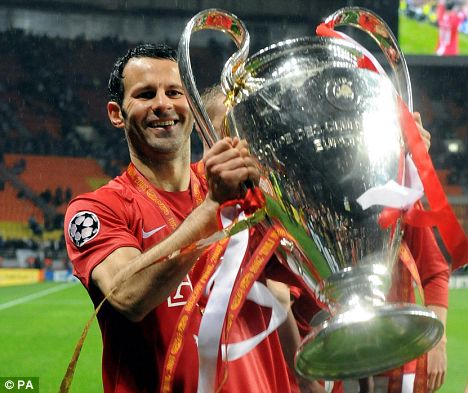 “I get asked about Ryan all the time and I always find myself talking about the same attributes — the way he’s looked after his physique, the way he constantly strives to better himself and the way he applies himself to make sure he succeeds,” long-time United manager Sir Alex Ferguson told Goal.com. “He’s a fantastic role-model for young players. Ryan is a model of how to carry yourself, both as a footballer and a human being. He’s shown by sacrifice what can be achieved.”
“I get asked about Ryan all the time and I always find myself talking about the same attributes — the way he’s looked after his physique, the way he constantly strives to better himself and the way he applies himself to make sure he succeeds,” long-time United manager Sir Alex Ferguson told Goal.com. “He’s a fantastic role-model for young players. Ryan is a model of how to carry yourself, both as a footballer and a human being. He’s shown by sacrifice what can be achieved.”
The 5-foot-11, 157-pound Giggs played in his first UEFA competition in June 1991. But his finest UEFA performances arguably have been this year. In the quarterfinals, Giggs assisted teammate Wayne Rooney’s winner in the first game, then set up Javier Hernández and Park Ji-Sung in the clincher. Giggs was predictably modest about his contribution:
“I am enjoying it,” Giggs said. “I was fortunate to make the two goals tonight and I am in the position where I put it in the right areas. You’ve got players like Hernández who are just born goal-scorers and they are going to be there.”
Teammates feel the same way about Giggs. He has been there for 20 years. Don’t be surprised if he’s there on 28 May.
— New Old Flame (Stan Johnston)
 Bottom line: Since 1992, Giggs has collected 11 Premier League winner’s medals and five second-place finishes. He also has four FA Cup winner’s medals, three League Cup winner’s medals and two Champions League winner’s medals. In addition, he has runner-up medals from the Champions League, three FA Cup finals and two League Cup finals.
Bottom line: Since 1992, Giggs has collected 11 Premier League winner’s medals and five second-place finishes. He also has four FA Cup winner’s medals, three League Cup winner’s medals and two Champions League winner’s medals. In addition, he has runner-up medals from the Champions League, three FA Cup finals and two League Cup finals.





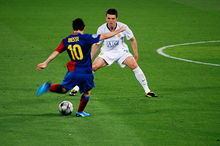
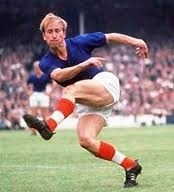


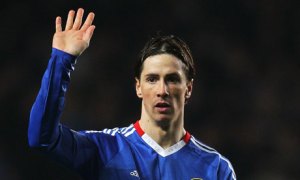

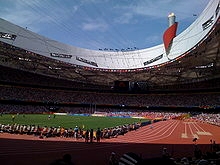


Recent Comments